Facebook ads are a great way for psychotherapists, therapists, and coaches to reach their target audience and offer new services. But there is more than one way to run successful Facebook ads for therapists, so you need to learn the best approach and how to comply with Facebook policies launching Facebook.
In this article, I’d like to show you how to run successful Facebook ads for psychotherapists from studying your audience to your first launch or optimization. We’ll talk about what offers and creatives to choose to increase the click-through rate for your ads and get more leads.
Table of contents:
- Why should psychotherapists use Facebook ads?
- How to comply with Facebook policy to not get banned
- 13 Tips to Successful Facebook Ads for Psychotherapists
- Step-by-step guide for writing a good offer
- Target audience research for psychotherapists + Template!
- How to create your first campaign
- What Interests to choose exactly on Ads Manager for Facebook Ads for Psychotherapists [with screenshots]
- 7 more Tips for optimizing your campaign and lowering the cost per click (CPC)
- Examples of successful psychotherapy-related Facebook ads
- Free & Paid tools for Facebook Ads for Psychotherapists
- Psychology behind Facebook Ads
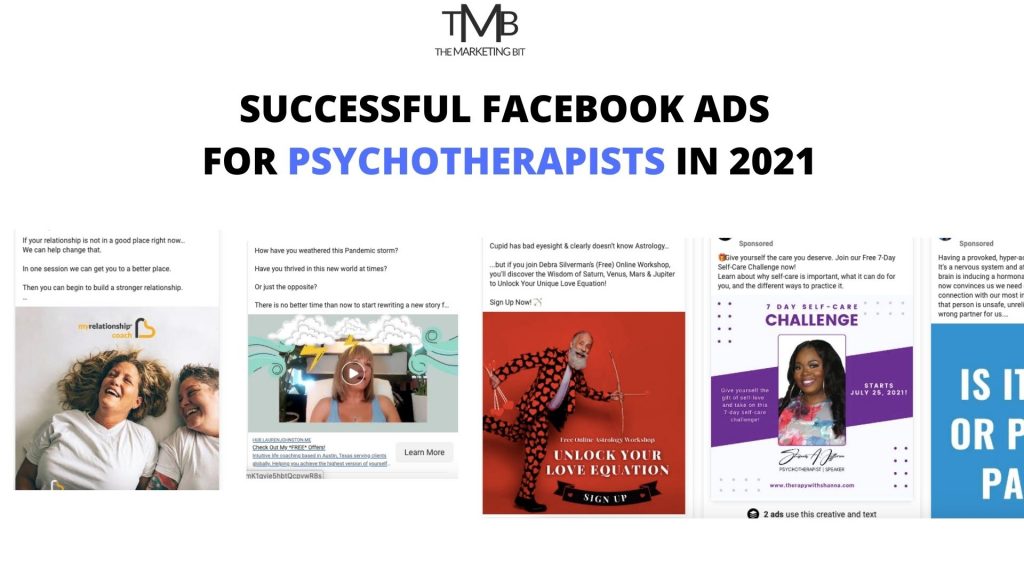
Why should psychotherapists use Facebook ads?
- The great thing about Facebook marketing is that you can target people specifically. You know their interests, demographics, and more. So if your practice is in a specialty niche, you simply choose these interests on Facebook ads.
- You are reaching people in their “natural” habitat – social media. They are relaxed, or bored, or excited, or sad. They don’t have to use other apps to connect with you. Everything can happen at one place. The easier the process is, the more likely people will contact you.
- You’re proactive. Compared to Google ads when your ad will be only visible when people search for “therapist”, on social media you can reach people without them actively looking for you.
- Not everyone still today is comfortable with googling directly contacts of therapists. Not everyone even knows what are signs when you may need help. Creating a relevant, precise offer can help people identify the problem and see you as the person who can solve it.
- Ads make you familiar to me. Think about it: if one day a person will decide to talk to a therapist, who they will choose: someone unknown or someone whose posts they were seeing for past 3-6 months and found them useful?
- Good funneling and building an email list or followers group is a long-term strategy. Content + ads will create engaged audience and you will have a long list of clients.
- Once you make some tests, your Facebook ads can be a predictable source of new clients. You can plan acquisition and budget for a whole month. Even now, you can read some studies showing that average cost per click in healthcare is $1.32, while average cost per action (cost per lead / per message, etc) in healthcare is $12.31.
- One of the major reasons why you need to run some ads and that some of your successful competitors have been on the advertising scene for a while already, but some are still absent. It is up to you to beat them. Every year, even every 6 months it is more and more difficult to deal with users’ banner blindness.
- Ads work faster than blog posts. Yes, SEO-optimized blog posts will also generate you leads, but sometimes it takes up to 8 months. Meanwhile, ads on Instagram can work right now and make you some money.
Facebook Policy: How to do ads for psychologists without being disapproved or banned?
Facebook algorithm crawls every single text, image, or video, your Instagram profile, your Facebook Page, your website, your previous advertising activity, your trustworthiness, and payment history – and all of them should comply with main Facebook policies.
Yes, the Facebook policy may seem vague sometimes and has irrelevant restrictions, but it is what it is. You can’t do certain things and if you want to advertise you have no choice but to comply.
This is crucial! Once or twice you can be banned or simply restricted, but one day you can lose ALL your data. Is it worth it?
Based on Facebook policy therapists or psychologists should:
- Avoid any misleading information – we can’t promise to heal traumas in 15 minutes.
- not discriminate or encourage discrimination.
- not include any personal attributes, in our case it is especially medical conditions. It means you cannot emphasize that a person has severe depression or any disorder in order to target them. It is the same as if we will call someone “fat”.
- not contain any shocking content.
- not contradict WHO guidelines. If you’re using any methods that are not approved, you can be banned.
- avoid grammar, punctuation, and other mistakes.
- not add fake buttons to the images making them look like a call-to-action button.
- avoid lots of texts on the images.
- If you using lead generation forms you cannot request insurance information.
The official Facebook Advertising policies page: here is the link.
13 Tips to Successful Facebook Ads for Psychotherapists
The first thing that you should know about starting any Facebook ad campaign – whether it is an ad for psychotherapists or not – is that it’s important to make sure that your offer is compelling enough.
If people don’t see the value of what they will get by clicking on your Facebook post (whether this is through a lead form or just email addresses), then they won’t click on it.
Tips to Run Successful Facebook Ads for Psychotherapists:
- Make your offer clear. Offer a free trial if you have one available. Be specific in what are your fields: depression, relationships, abuse, etc. Never be too general. The next sections is all about offers.
- Try to have a good mix of videos, photos, and text on your Facebook ads for psychotherapists. This will help you create an ad that people want to click on because it looks more interesting than just one type of media or another. Testing various types of ads will help increase click-through rates (CTR) which in turn leads to higher conversion rates and better results. Different people react to different type of information. Some examples are below.
- Include benefits in the copy of your psychotherapist’s Facebook ad. If you are struggling with writing, use AI-powered writing tools created for increase conversions, as Conversion.ai (now it’s Jarvis.ai). This tool can create persuasive bullet points, Facebook ad primary texts based on your brief description.
- The more personal your Facebook ads are, the better. Psycho therapy practice is all about helping people with their problems and getting to know them on a deeper level, so make sure that you can put some of this into any posts for psychotherapists or Facebook ads for therapists that you create.
- Mention how much of an investment they would be making by choosing your offer (in terms of saved money or relationships. Use statistics and recent researches to prove your words).
- Create a compelling call to action for your Facebook ads for psychotherapists, not just simple ones such as “click here” or “get started”, try to think of a relevant call-to-action, even if it “Soothe your anxiety right now”. Use Power words, I am mentioning some of them below.
- Offer discounts for bulk purchases of sessions and make sure that you’re following all the rules of Facebook advertising policies when launching this type of ad campaign.
- Use photos with people’s faces in them. These are the ones that people respond to most, so it’s worth trying this out on some posts for psychotherapists and Facebook ads for therapists if you want to see what kind of difference it makes. Use people’s video testimonials if they are ready to do it and the topic is not too sensitive. Here are good examples of therapy ads.
- Know your audience. Get as much information from your clients as possible before deciding which offer or creative type to use. You’ll want to know their social media habits, which types of creatives they respond to the most, and what kind of offer is going to be best for them. Here is a template for Audience research.
- Always check what ads your competitors are running right now using Free Facebook Ad Library – the library with all active ads.
- Build your social media profiles and create useful content. A useful post is at once an organic source of new followers who trust you as you reveal valuable information but also material for advertising. Every useful post can be promoted! And I would highly recommend doing so. Advertise not only your services, but your expertise to gain trust and stand out from your competitors.
- Relevant landing page. Promoting your website may be tricky, as it is quite hard to create a conversion-oriented landing page if you don’t have experience in it. Note, that a landing page for a specific service will work better than sending people to a massive website with all kind of information. Again, the easier the way to contact you is, the better.
- Always analyze results to optimize your ads. Here are the section below with tips on increasing clicks.
- Bonus: use freechallenges and online marathons as first step into the funnel – great tool to get familiar with a lot of people at once, to show your expertise, to “sell” them individual work with you, your books or courses. The more variants of products you have, the better. But don’t just create them without preliminary Audience research.
How to create a good offer for Facebook Ads for therapists
There are a number of ways that you can make sure your offer is compelling enough for Facebook users.
One way to do this would be by offering a free trial so that people know what they’re getting into before committing to anything at all – even if it’s just signing up for an email list or some other form on your website.
But a free trial is so common and there is nothing special about it. Everyone is offering free trials, so this method is now less competitive.
Another way is to use your existing followers or clients to test out your ideas.
Let’s say you have an idea to run ads and make people book the first session with you. Saying that you’re just a therapist and they can talk to you isn’t enough. It is too general!
4 easy steps to find the best offer for a therapist
- List 5 to 10 ideas you want to try out with ads.
- Make a simple story with Idea #1 and a relevant poll sticker. Ex. Do you want a free session on how to deal with anxiety at work?
- Wait 24 hrs and check the results. Contact people who were already interested to schedule a session or to ask few additional questions. These questions may be like “Why you voted yes/no?“. Yes, ask people who voted “No” too, as they are source of valuable information too.
- After you gathered data about all you ideas. Select the most successful and promote them.
In fact, creating a good offer is based on deep preliminary work and research you need to do. This marketing research doesn’t have to be done by a professional team if you don’t have the budget for it. Normally, it is one of the first steps of building a marketing strategy for any business.
The better you know your audience, the better your offer will be, the better results you will have.
THIS METHOD WILL WORK IF YOU ALREADY HAVE CLIENTS. If it is your first time with ads, jump to this section.
Audience research for psychotherapists to run successful Facebook Ads:
- What main issues do your existing paying clients have?
It is important to consider only those who pay you and attend your sessions regularly, as it is the most relevant and proven audience for you.
Create a table and list all requests you had and you want to keep working with in the first column.
Fill other columns: work that was done, the period of work, and results. The ideal version of this table will include one more column: feedback from the client (ask them What tools or sessions worked best for you? What are the results for you?).
This is vital for advertising, as you will get the answers you can use writing ad copy and offers. Using the words that clients use means to be on the same page with future clients too.
Here is the Template for this table: Target Audience Template for Therapists.
As you can see this is an adapted version of a basic table for the Target audience. Yes, I know, it takes time and may feel a bit annoying. But trust me, it will give a lot of valuable ideas.
- Based on that list, what are your current main work fields?
Now you have one of the most valuable assets in your small business! No matter what happens and who will run ads for you, you can always share the document knowing that you know exactly who is your ideal client and what they want.
It means less budget wasting, more results, and more money!
After filling in all the information, you will see the main common traits. This is exactly what you can use as an offer and you already know what audience to target on Facebook. Even more precisely, what Interests to choose launching ads. You can offer a free demo session for these specific requests.
Ex., most of the clients were mid-age working mothers going through a divorce. It means you will no longer target men or women without kids, oh newly married couple. Instead, you can target women with kids or marital status “divorced”.
- Based on that list, what offers / lead magnets can you create?
Look at the work you’ve done with the client and their feedback.
What exercises or tools they mentioned the most or do you find the most effective? Maybe it was a sort of daily checklist for reducing anxiety or a simple test that revealed a lot for your client.
Create a checklist with short comprehensive guidelines and launch ads. People will get more even before they paid you. At the end of the guide, you can mention a demo session with you or leave a direct contact to book a full paid session.
This is how you can create a simple funnel without a marketing team.
Consider how people make a decision? Do they think about it or it is emotional? Will they ask friends’ or partners’ advice?
It is important for you, as you can play with this information writing your ad copy. If they are more emotional, you can add Powerful words. Now, powerful words are words that marketers proved as increasing conversion.
Use these words in headlines or call-to-action:
- free
- new
- guaranteed
- special
- limited
- powerful
- useful
- practical
- easy
- successful, etc.
There are more than 180 Power words.
A good text is hard to write, especially if you need some of them regularly. I often use AI tools to helps me reinforce my texts, as I want the highest CTR (click-through-rate) possible. I would recommend the only tool that creates relevant outcomes – Conversion.ai (now rebranded in Jarvis.ai), where you can get 10,000 words for free (which is also nice for small businesses).
- Set up your Ads.
Using all the information, create 1 to 5 ad primary texts, creatives and check the relevant interests on Facebook Ads Manager.
Set up an ad campaign. On the level of the Ad set, go to the Detailed targeting and type a keyword:
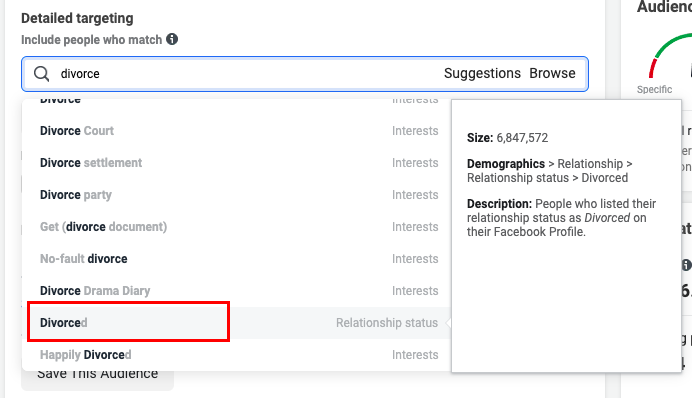
How to create your first campaign
The method before is great, but you may think Great, but I don’t have so many clients and I’m just starting or changing my field.
No worries!
For those who just start their therapy career or you are dramatically changing the field, I would recommend focusing 80% of their efforts on creating evergreen useful content for your Facebook page and Instagram account, and 20% on promoting this content.
Your main goal should be strategic: create trust and a community that will refer to you and recommends you for free.
I understand that you need ads to get more clients and money, but useful content can also generate money. Just give it time!
- Publish a post using low competition hashtags and promote it with the button “Promote” to generate more Profile visits.
- Run an ad for 3-5 days to evaluate the results. Check the insights regularly.
- After a while (14 days), check the posts insights and note what topics gain the most engagement.
- Create a story or a post announcing free demo session on this specific topic. Get first comments. If they are positive and you have first few people, promote this post.
After you get more confident, use the long way to study your target audience and launch larger ad campaigns via Ads manager.
How to create your first campaign with Facebook Ads Manager
Personally, I like the Instagram button Promote, but its possibilities are very limited. The next level is Ads manager, where you can play with more settings.
Before launching ads, you still need to list potential ideas on who can be your client and what specific problems you can solve.
You can still use the Target Audience Template but operate with hypothetical clients, ideal clients. Don’t be too broad. Be as precise as you can. Focus on 3-5 major issues you will work with and select 3-5 audiences avatars as well.
- Go to your Ads manager
As Facebook is constantly changing its interface, it may be confusing to find where your Ads are. There are few options:
- via Create -> Ads
- on the left side of your Home page
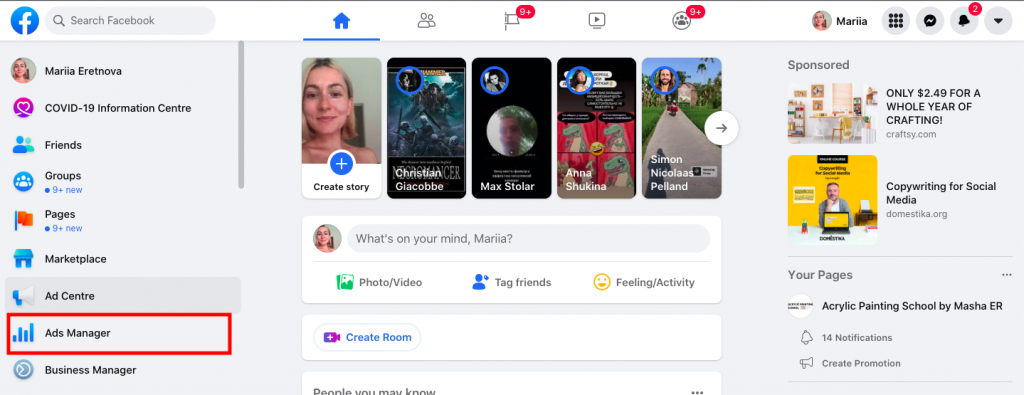
2. Make sure you added your credit card as it is impossible to run ads without a preselected payment method. Depending on your country, Facebook may apply taxes on top of your spendings. Facebook charges you once your limit is achieved (you can set it yourself) and on a specific date once a month.
3. Create New campaign by clicking on the green button.
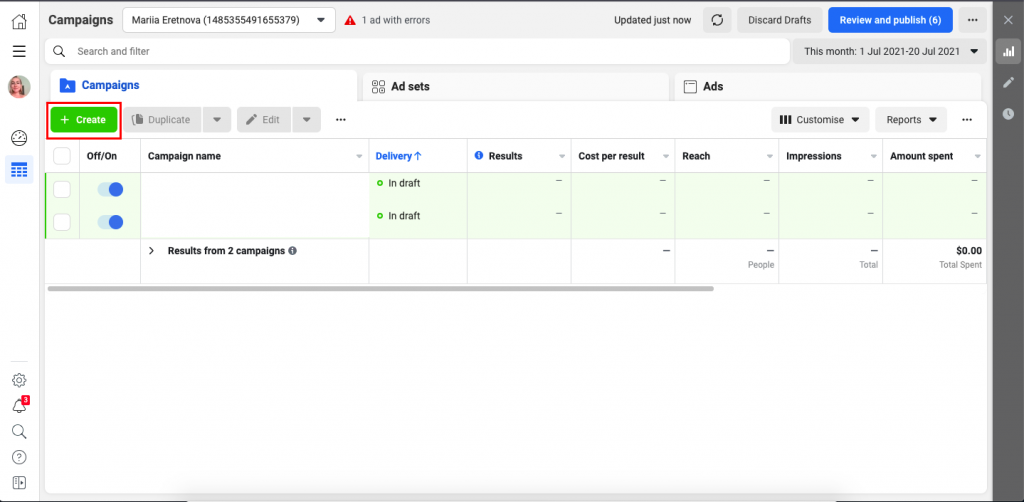
Now, there are 11 campaign types or objectives on Facebook. Each of them is relevant to a specific case. If we’re talking about therapists, I would recommend:
- Engagement for promoting Facebook or Instagram posts
- Traffic to promote a new website
- Conversion after your website got first few hundreds of visits.
- Lead generation if you don’t have a website but want people to quickly fill in the form and schedule a session with you.
Please, note that Traffic and conversions are worth trying if you have Pixel installed on your website.
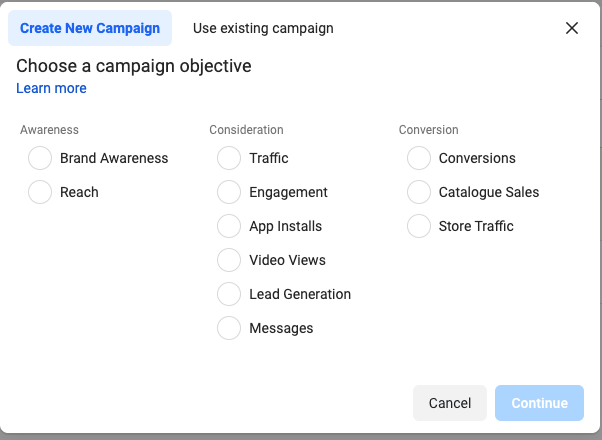
4. Name your campaign and start setting up your first Ad set
- choose people living in this location to avoid tourists
- set age range
- if you have instagram account try to always exclude its audience to make sure you don’t spend extra money on showing ads to your own followers
- choose interests and behaviors from Detailed targeting.
- always choose manual placement and select Facebook feeds, or Stories or whatever you feel like. Don’t mix them all in one Ad set.
- try to aim at the potential reach in between 300 000 and 1 million.
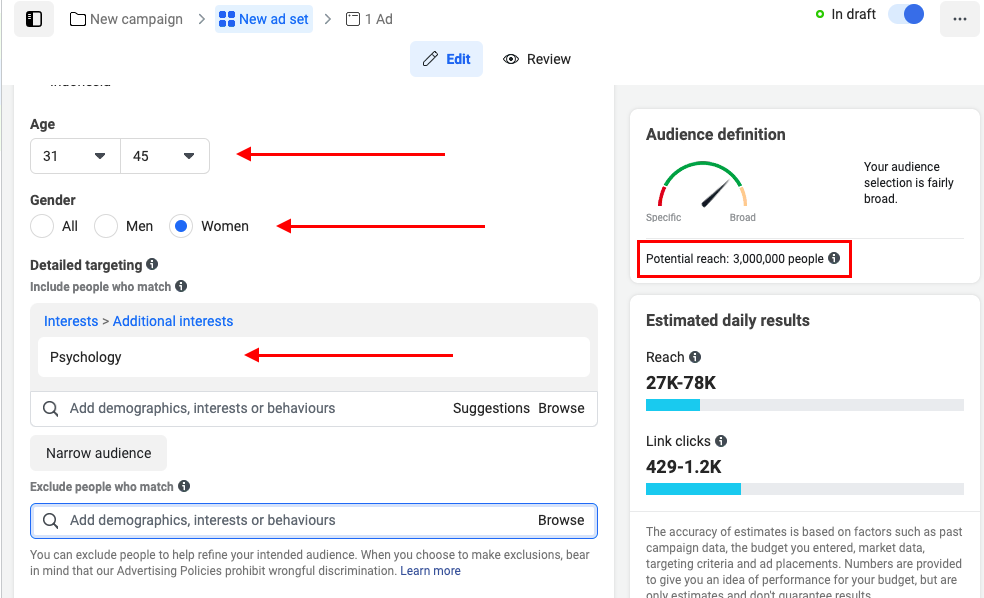
What Interests to choose exactly on Ads Manager for Facebook Ads for Psychotherapists
I guess this is probably why you’re googling “Facebook Ads for Psychotherapists”, you need to see the exact setting to use and the creative ideas.
The problem is that the success of any ad is 30-50% of technical settings, it is more about how good you know your own people. How good you know their insecurities, their ultimate goals, and how you communicate your offer.
Many times I saw very basic designs winning the race, while sophisticated illustrations (on which a designer spent 3 days) brought 0 results.
Now, let’s dive in and see what Interests, behaviors, or demographic data we can use to target potential therapy clients.
Note, they are general, as I do not know your specific situation, but they may sparkle an idea in you!
How to target therapy clients on Facebook Ads
- Use Custom Audiences
- If you have an Instagram with some active and engaged followers, you can target them
- You can target people like your follower (look-alike audiences)
- If you have a blog or website, you can target website visitors (try visitors for last 30-60 days, but not more as they are already pretty cold).
- You can create look-alike audience based on people who read your blog or visited your website. It will work if your website have a decent amount of traffic (about 1,000 views per month).
- You can upload a file with phone numbers or email of your email subscribers or clients and target them with new offer.
- You can build a look-alike audience based on this email/phones list.
- You can exclude any of these audiences to save your budget. At least, try to exclude your followers.

- Use the right locations
If you’re targeting a specific region, make sure you selected “People living in this location” to make sure you don’t target tourists. It will also help you get clear analytics if you targeting different regions in different ad sets.
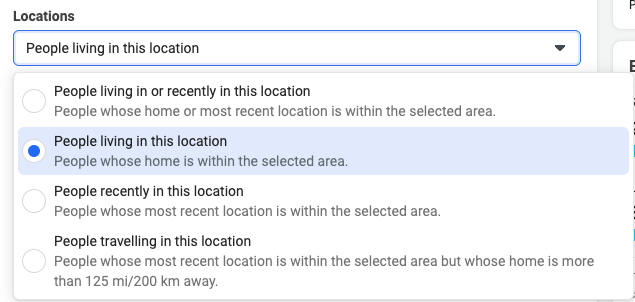
If you providing services or selling courses online, it will still be important, as I said, to get transparent statistics.
If you’re aiming for travelers, choose the relevant setting too.
If you’re working with countries, you can also exclude some regions that you already know as not relevant for you:
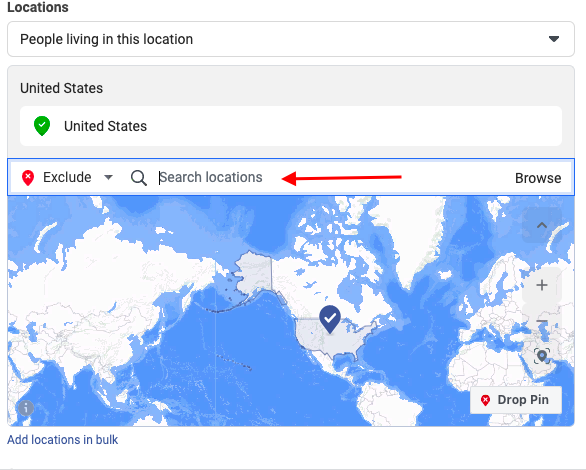
You can also target only big cities, ex., if you’re working mostly with corporate clients:
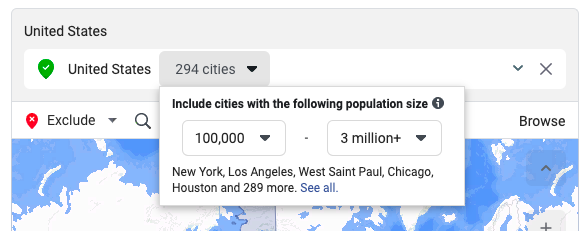
- Age and gender – use data from either your ideal client profile or your real data. Don’t choose a very broad age range, like 20-50. Optimize this section after your first advertising month. If men are less likely to take action, target only women. If they are both active, but at a different costs, create separate Ad sets for women and men.
- Detailed targeting
The most important part.
- Option one is to switch on “Detailed targeting expansion” and test what audience Facebook will target for you. Automated, but you will never be able to analyze it. Can be used to see the potential.
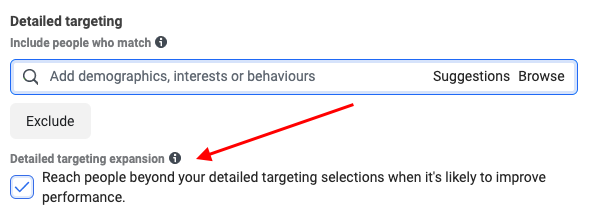
- Option two is to dig into detailed targeting.
Detailed targeting has several categories:
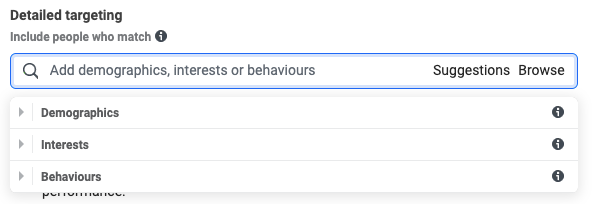
- Demographics
Demographics allow you to target people based on the information they provided about themselves on Facebook: their relationship status, job title, etc.
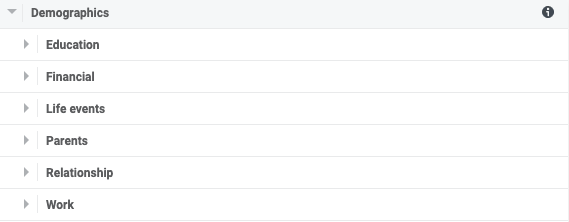
What is it for us? For Facebook ads for psychologists, you can use the following Demographics settings:
- target mothers to help them with postpartum depression [Section Parents]
- target divorced people to help them go through the break up [Section Relationships]
- target specific job titles or companies, if you know, based on your Audience research, that Lawyers are more likely to be your clients [Section Work]
- target education levels or a University if you mostly work with students or education system employees. [Section Education]
- target people away from their home town, as they may feel depressed or isolated. [Section Life events].
- target people in long-distance relationships if you are a relationship coach working with this topic.
- choose widowed people if you help people healing from a loss.
- Interests
The largest section is based on the Facebook algorithm. It scans what kind of content you like or share, what kind of ads you watch and what topics you follow. And it makes suggestions about you, creating a profile.
From 2021 Apple allows iOS users to opt-out. It means you can restrict Facebook from gathering and using your data. On one hand, it benefits your security, on the other hand, you will get random ads, as Facebook doesn't know anymore what do you like.
Try to find relevant interests by typing in keywords or manually browsing all interests:
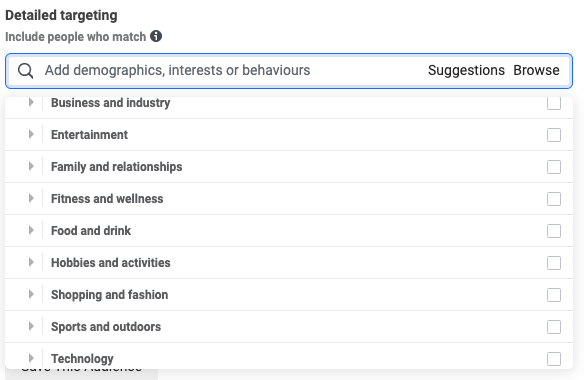
Do not use more than 5 interests in one Ads set, it is too broad. The Facebook algorithm will try to find a person matching one of the interests you added, but you will not see what interest was it.
One ad set – tightly connected interests.
Note, that according to the Facebook policy you can’t directly target people with say depression, so you will not find this direct interest on the list.
For Facebook ads for psychologists, you can use the following Interests:
- You can exclude organisations, as we may think, the psychotherapists are more likely to be part of them. But if you’re offering services for your colleagues, target these organisations.
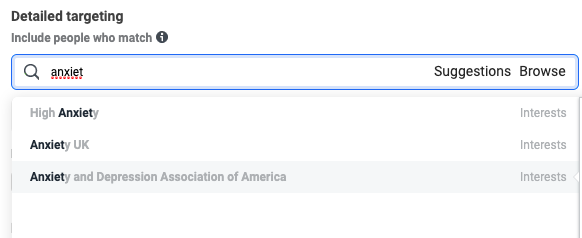
- Don’t use the broad interest “Psychology” if you’re looking for clients. This field is super broad, and likely to include other professionals like you. But, if you want to promote just content, you can use it.
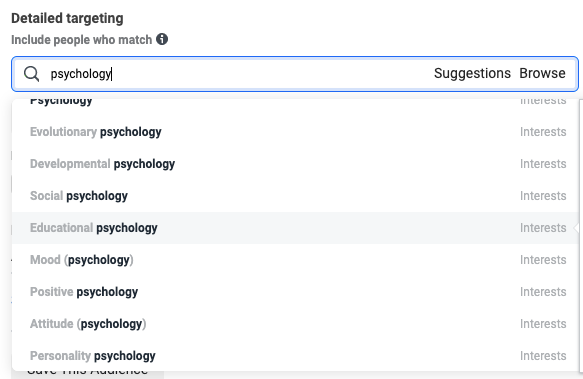
- Try interests like:
- self-healing – to promote your help, your content, your books or guides
- self-care, self-love, self-awareness – these are people motivated to work with issues and already on their way
- meditation, relaxation techniques
- empowerment, gratitude
- personal development, coaching – people ready to work with a specialist or your colleagues too. These are quite broad interests, but you can narrow them and combine with something else.
- sleeping positions and interests related to sleep if you work with insomnia
- panic disorder
- psychologists – it could be both clients and future colleagues
- relationships, relationship counseling
- dating coach, life coaching – both clients and colleagues
- therapy dog – this person seeks for solutions.
- family therapy, gestalt therapy and other branches – both colleagues and clients. Some clients like to study different approaches by themselves before they commit to one therapist.
As you can see there are a lot of options, but they all need tests. Unfortunately, we can’t expect quick results with ads nowadays – we are so overwhelmed with information influx! Experiment!
- Use Suggestions to see what else Facebook has for you:
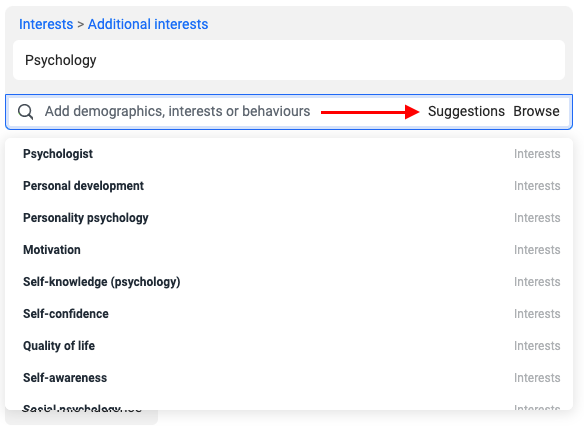
- Behaviours
Behaviors tell us how this person interacts with Facebook. How they act online.
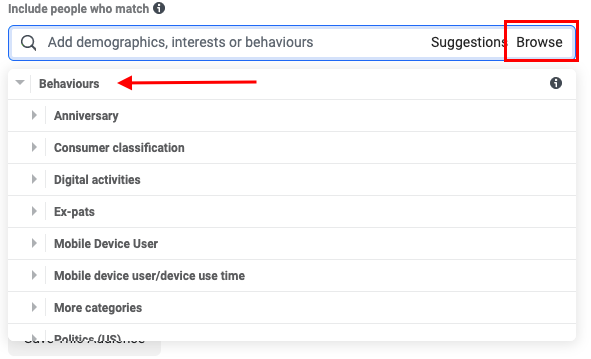
- you can target gamers (they play games on Facebook or consoles)
- expats in specific countries
- in US you can target 3 major politic category: conservative, liberal, moderate, if you feel like your clients are part of any of them
- frequent travelers
- people whose anniversary will be soon
Tips for optimizing your campaign and lowering the cost per click (CPC)
Once you launched your ads consider my expert tips to optimize your budget and get stable results in a long run:
- monitor the frequency – don’t spend money on showing the same ads to the same people. It is not only wasting your money, but annoys users.
- monitor CTR and try to get as high as you can. Never aim to a CTR less than 1%. I need to mention here, that this tip is not applicable if you have sales or booking with super low CTR. Amount of leads is more important than CTR, but CTR may be one of the tools for optimizing.
- CTR can be increased by rotating various creatives: try images with and without text, try illustration or graphic design, videos or slideshow. Test as much variants as you can. Monitor the results and turn off the non performant ones.
- Use dynamic ads to test up to 10 images or videos at once.
- Test primary texts and headlines. Write 5 texts in different style, aiming at different personality types: emotional, insecure, specific brief information, short as copy or long ones.
- Try different campaign objectives: when you’re starting use trafic, but once you gathered some data with pixel, use conversions.
- Use retargeting and look-alike audiences! Costs per action for these categories are way lower amd the audience is warm and familiar with you.
Examples of successful psychotherapy-related Facebook ads
I highly recommend using Free Facebook Ad Library to spy on other psychotherapists and their ads. How do they promote their sessions, books, services?
As we discussed, try to use people’s faces, even if it is your face, especially if you’re promoting your seminar or book:
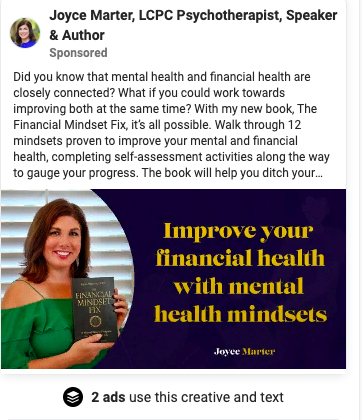
Note, that primary text in this ad is not perfect – it is hard to read, as it lacks structure. Always add paragraphs, bullets, emojis to make your text easy to read.
As we see in the next example, the author – a relationship educator – knows exactly the fears, issues, and desires of his target audience and he uses them directly! It is a good example of content to promote rather than direct offer ads.

Here is a bad example, what you should not do:
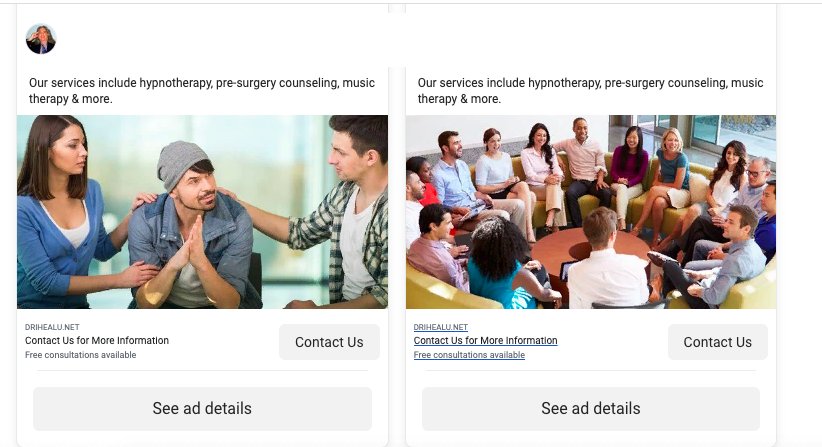
Images are from stocks and everyone can see them. There is no specific information: what they offer and why I should be interested in it – it is a little bit of everything from music therapy to pre-surgery counseling. There is no call-to-action text. And only at the bottom, I can notice that there are “free consultations available”. But would I contact them? Unlikely.
More good examples:
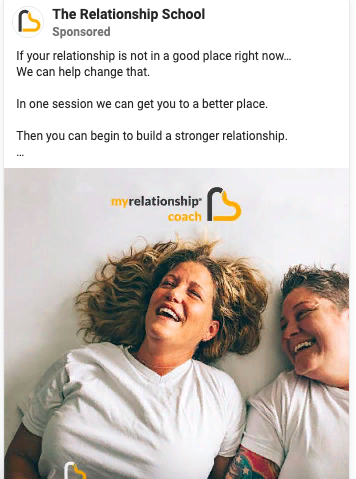
Using videos in the ad campaign is also important and is worth testing:
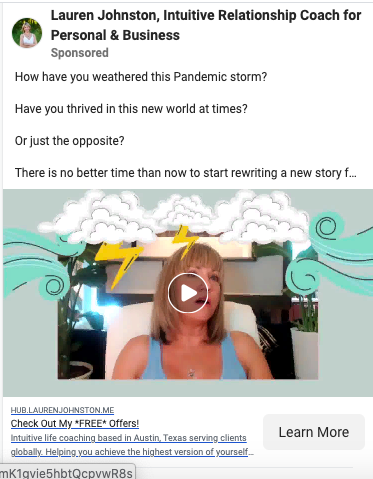
She wrote good personal and at the same time professional texts using terms her potential clients will use. She added Headline and Power word Free. Her video isn’t boring which stands her out her competitors. Great job!
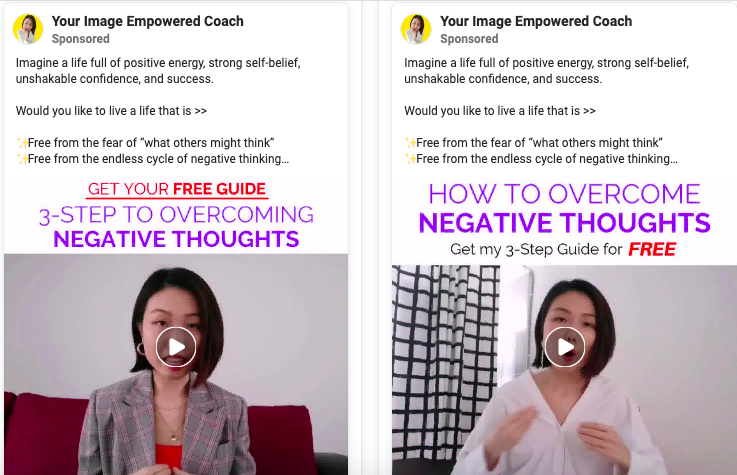
Another excellent example – she is promoting her Free guide – a clear offer, and she created several different videos for the test and a strong text with persuasive bullet points, very relevant to her target audience.
You see know why it is so important to know your audience and to use their own terms and situations in ads?

Another great example of knowing your audience – who do they target? Successful women who are in relationships, not just all women, but a specific group of them.

As we discussed, we can’t point at disorders, but we can use illustrations and graphic design to deliver our message.
Free & Paid tools for Facebook Ads for Psychotherapists
- Conversion AI can help you create ad headlines and primary texts. If you’re not sure about using this tool, with my link you can try first 10,000 words for free.
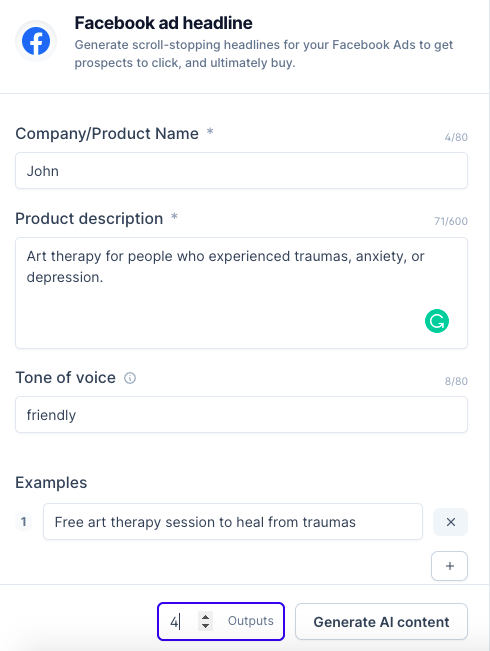
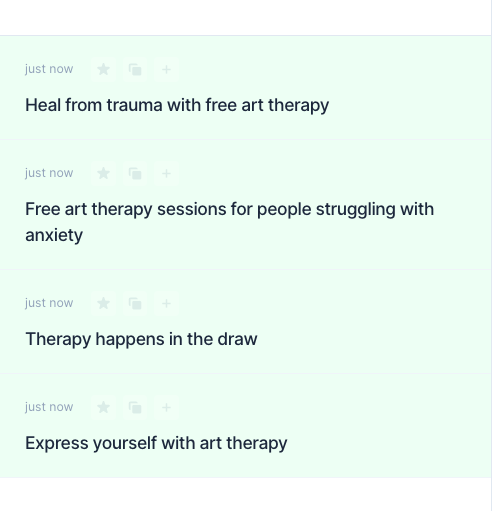
You can even use the oldest (and best so far) frameworks to create ad primary texts, such as AIDA – attention, interest, desire, action – which lead a user to take action you need them to take.
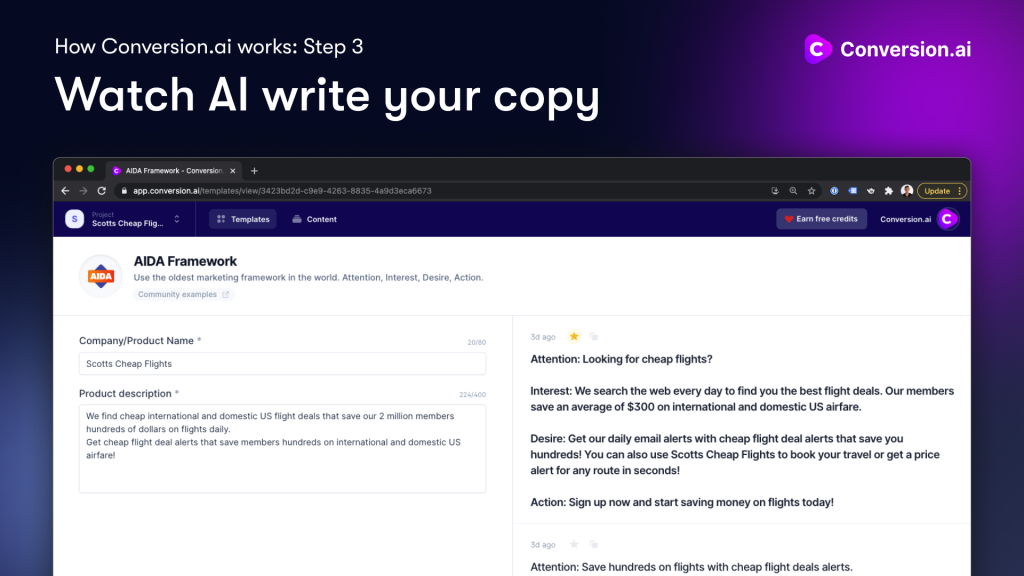
- Free Facebook Ad Library will help you spy on your competitors. Type in the name of competitors’ Page and check what ads they are running right now.
- Canva – the best and easy way to make some creatives by yourself without a pro designer. Honestly, your designs will look great! I am used to edit videos with Videoleap App on my phone, but all graphics, posts, stories, presentation I make in Canva.
The psychology behind ads on Facebook
I think therapists reading this post will be curious to read what recent studies think about the Facebook advertising phenomena.
- People feel bad, sad, angry and frustrated using Facebook
Some scientists in German universities studied 600 social media users. One in three respondents felt worse after browsing the social network, especially if they browsed vacation images. Dissatisfied Facebook users were also more inclined to spend time on the site without submitting their own content.
The authors of the study note that both men and women are under pressure to present themselves in the best possible light to their Facebook friends, but men are more likely than women to post more self-promotional content in their “About Me” and “Notes” sections, despite women being more likely to emphasize their physical attractiveness and sociability.
A 2017 study in the U.K. found that among 1500 Facebook and Twitter users surveyed, 62% reported feeling inadequate, and 60% felt jealous as they were comparing themselves to others.
2. Facebook uses your interests “against” you
Facebook also benefits from the fact that people are more likely to click on Facebook ads. The Facebook algorithm is designed in such a way that it will show you posts and articles of things you’ve expressed interest in.
This means when facebook shows an ad with products or services related to your interests, you’re much more inclined to purchase something than if facebook randomly showed you something that had nothing to do with your interests.
3. Facebook knows that you’re bored or sad
Facebook also knows that when people are sad they’re more likely to spend money and facebook uses this by showing ads for products or services related to sadness.
4. Facebook is Comfortably Passive
Facebook lets us feel lazy and encourages scrolling as we are guided by curiosity or boredom. It also makes us less patient. Advertisers know that 3 first seconds of the promo video are the most important. If the user is not interested in 3 sec, they will skip the ad.
5. The Five-Factor model of personality types
Researches described 5 personality types of Facebook users 7 years ago already! See for yourself if the data is still accurate.
- Extraversion: Low levels of extraversion imply a quiet and shy disposition, while high levels indicate an adventurous, sociable, and outspoken nature. People with high degrees of Extraversion have been demonstrated to respond to advertisements that imply social incentives or excitement.
- Conscientiousness: Low levels imply a disorganized, easily distracted nature, whereas high levels indicate a hardworking, orderly, and thorough personality. It’s also been suggested that customers with high degrees of conscientiousness will respond better to advertisements that deliver information rather than elicit emotions.
- Agreeableness: Low levels imply a reserved and distant demeanor, whereas high levels reflect a warm and compassionate disposition. When viewing advertising, those with low levels of Agreeableness are more likely to have mixed emotions and, as a result, have less favorable sentiments.
- Neuroticism: High levels imply a sensitive, neurotic personality, whereas low levels indicate stability and emotional control. People with greater levels of Neuroticism are more inclined to respond to advertisements that imply safety and security.
- Openness: Low levels reflect a traditional, change-resistant personality, whereas high levels indicate a creative, novelty-seeking nature.
Personality types and Facebook advertising: An exploratory study by Lillian Clark and Levent Çallı
Psychological targeting as an effective approach to digital mass persuasion by S. C. Matz, M. Kosinski, G. Nave, and D. J. Stillwell
6. Facebook is a tool to get rewards signals for our brain and social acceptance.
It is easy to trigger people showing them ideal life, success, and, on the contrary, their fears, pains.
7. Powerful words
Texts also became a tool with ads. I mentioned a shortlist of Power words, but there are more facts to consider, like the word Free can drop the cost per lead by 25%.
Use of words “my” or “your” also can increase results, sometimes up to 90%.
Check other Facebook Ads related guides I published:
